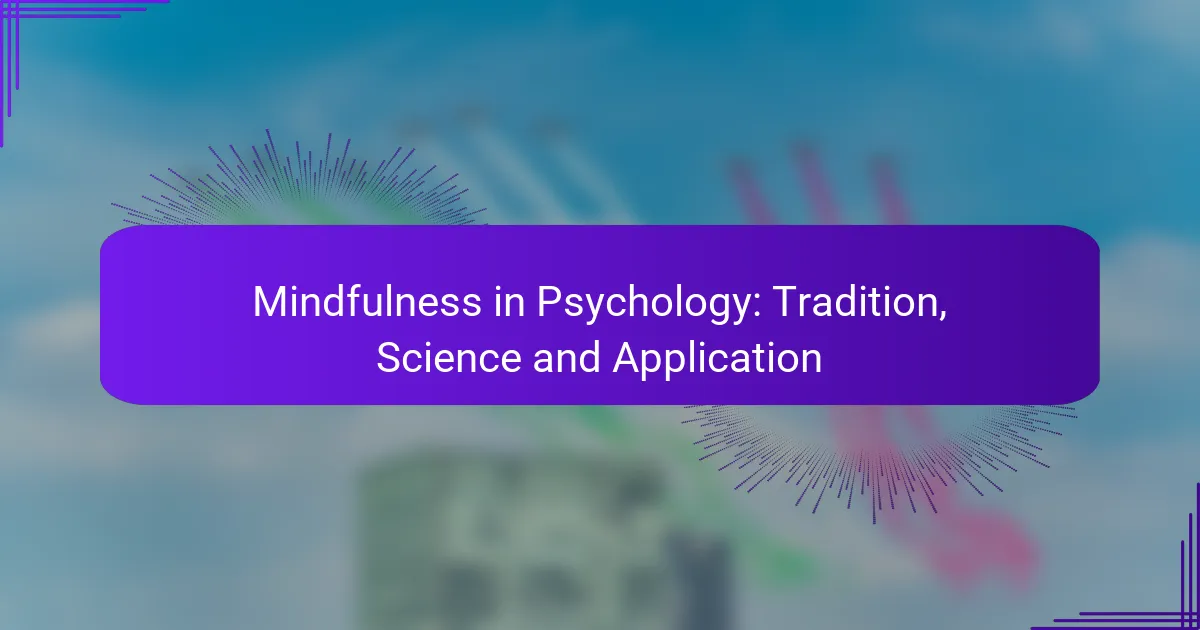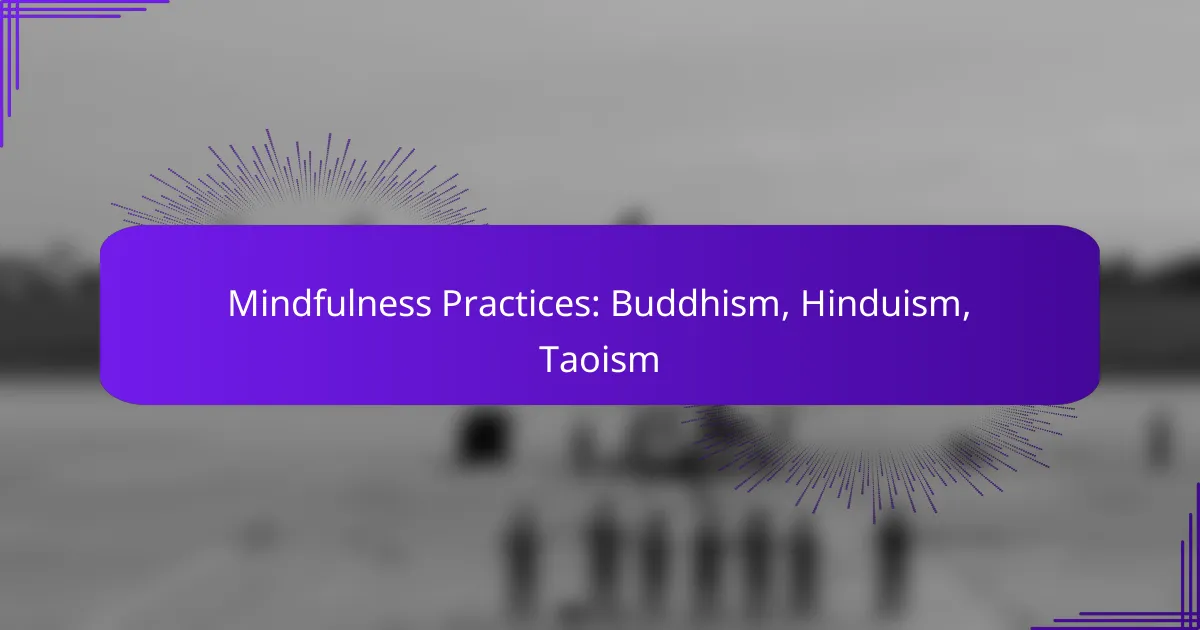Mindfulness, rooted in ancient traditions, has gained prominence in psychology as a powerful tool for enhancing emotional regulation and mental well-being. By encouraging individuals to focus on the present moment, mindfulness practices can significantly reduce anxiety and depression, leading to improved mental health outcomes. This approach is particularly beneficial in urban settings, where the stresses of modern life can challenge emotional resilience.
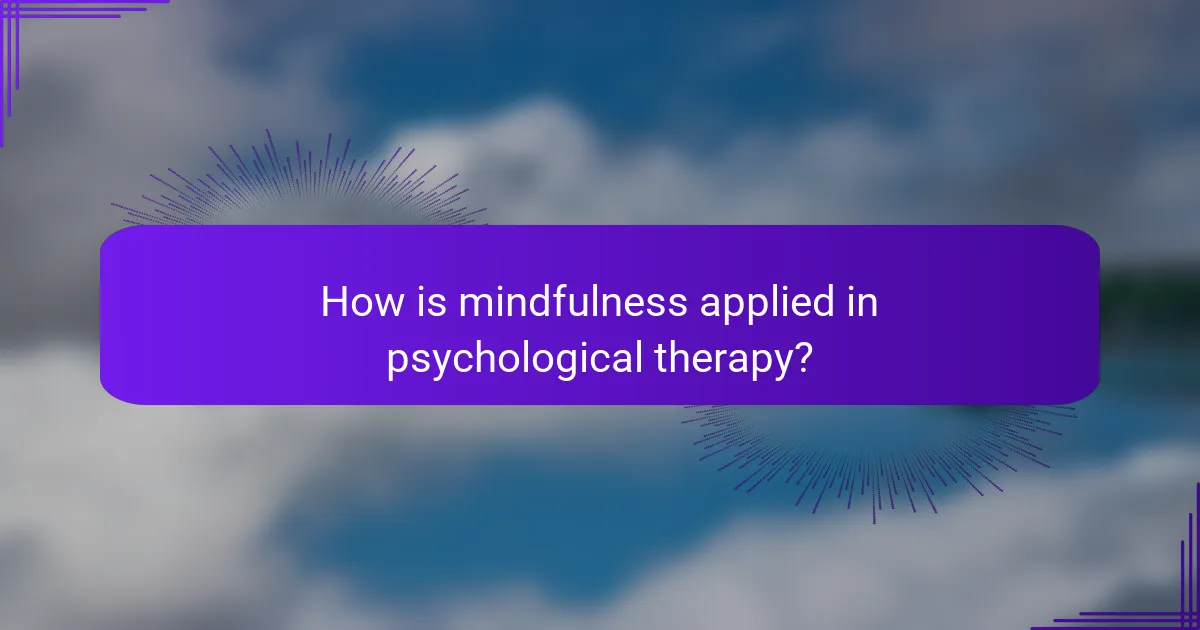
How is mindfulness applied in psychological therapy?
Mindfulness is applied in psychological therapy to enhance awareness and promote emotional regulation. It helps individuals focus on the present moment, reducing anxiety and improving overall mental health.
Cognitive Behavioral Therapy integration
Mindfulness can be integrated into Cognitive Behavioral Therapy (CBT) to help clients recognize and alter negative thought patterns. This combination encourages individuals to observe their thoughts without judgment, fostering a more balanced perspective.
Practitioners often guide clients through mindfulness exercises, such as breathing techniques or body scans, to ground them during therapy sessions. This approach can enhance the effectiveness of CBT by promoting greater self-awareness and emotional resilience.
Mindfulness-Based Stress Reduction
Mindfulness-Based Stress Reduction (MBSR) is a structured program that incorporates mindfulness practices to alleviate stress and improve mental well-being. It typically spans eight weeks and includes meditation, yoga, and group discussions.
Participants learn to cultivate mindfulness through daily practices, which can lead to significant reductions in stress-related symptoms. MBSR is widely recognized in clinical settings and is often recommended for individuals dealing with chronic pain or anxiety.
Acceptance and Commitment Therapy
Acceptance and Commitment Therapy (ACT) utilizes mindfulness to help clients accept their thoughts and feelings rather than fighting against them. This approach encourages individuals to commit to personal values and take action toward meaningful goals.
ACT emphasizes psychological flexibility, allowing clients to navigate difficult emotions while remaining focused on their values. Techniques such as mindfulness exercises and experiential activities are integral to this therapy, promoting a deeper understanding of oneself and fostering acceptance.

What are the benefits of mindfulness in psychology?
Mindfulness in psychology offers numerous benefits, including improved emotional regulation, reduced anxiety and depression, and enhanced focus and attention. These advantages stem from the practice of being present and fully engaged in the moment, which can lead to significant mental health improvements.
Improved emotional regulation
Mindfulness helps individuals become more aware of their emotions, allowing for better emotional regulation. By practicing mindfulness, people can recognize their emotional triggers and respond to them more thoughtfully rather than reacting impulsively.
Techniques such as deep breathing and body scanning can aid in this process. Regular practice can lead to a greater ability to manage stress and maintain emotional balance, which is crucial for overall well-being.
Reduced anxiety and depression
Engaging in mindfulness practices has been shown to significantly reduce symptoms of anxiety and depression. By focusing on the present moment, individuals can break the cycle of negative thinking that often fuels these conditions.
Mindfulness-based interventions, like Mindfulness-Based Stress Reduction (MBSR), have demonstrated effectiveness in clinical settings. Participants often report feeling calmer and more centered, with many experiencing a decrease in the frequency and intensity of anxiety and depressive episodes.
Enhanced focus and attention
Mindfulness training can lead to improved focus and attention, making it easier to concentrate on tasks. By practicing mindfulness, individuals learn to minimize distractions and maintain their attention on the present moment.
Simple techniques, such as mindful breathing or meditation, can be incorporated into daily routines to strengthen this skill. Over time, consistent practice can enhance cognitive flexibility and increase productivity in both personal and professional settings.

How does mindfulness impact mental health in urban populations?
Mindfulness significantly enhances mental health in urban populations by reducing stress and improving emotional regulation. It fosters resilience against the unique pressures of city living, such as noise, overcrowding, and fast-paced lifestyles.
Stress reduction in high-density living
High-density living often leads to increased stress due to constant stimuli and social pressures. Mindfulness practices, such as meditation and deep breathing, can help individuals manage this stress by promoting relaxation and enhancing focus. Regular mindfulness sessions can lower cortisol levels, which is linked to stress, leading to improved overall well-being.
For effective stress reduction, urban residents can start with short daily mindfulness exercises, such as five to ten minutes of focused breathing or guided meditation. Over time, these practices can build resilience and create a calmer mindset amidst the chaos of city life.
Community mindfulness programs in cities
Many urban areas are implementing community mindfulness programs to support mental health among residents. These programs often include group meditation sessions, workshops, and mindfulness-based stress reduction (MBSR) courses. By fostering a sense of community, these initiatives help individuals connect with others while learning valuable coping strategies.
Participating in local mindfulness programs can provide a structured environment for practice, making it easier for individuals to commit to regular mindfulness. Cities may offer these programs at community centers, parks, or through local health organizations, often at low or no cost, making them accessible to a broader audience.
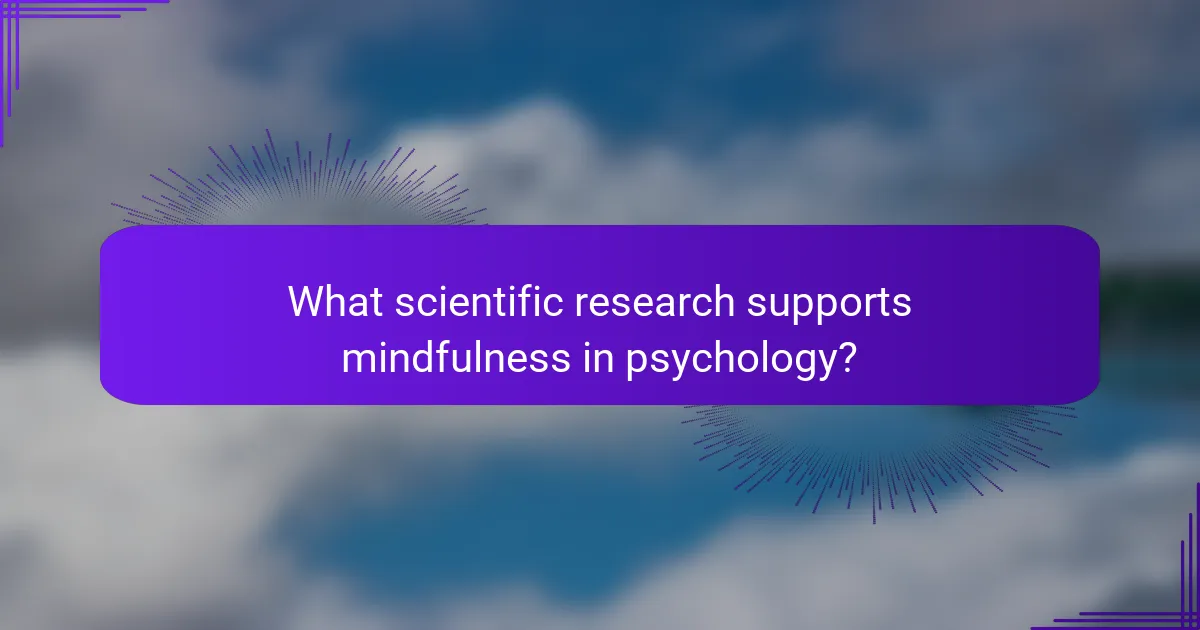
What scientific research supports mindfulness in psychology?
Scientific research has increasingly validated mindfulness practices in psychology, demonstrating their effectiveness in enhancing mental health and well-being. Studies indicate that mindfulness can lead to significant improvements in stress reduction, emotional regulation, and overall psychological resilience.
Neuroscientific studies on brain changes
Neuroscientific research has shown that mindfulness practices can lead to observable changes in brain structure and function. For instance, regular meditation may increase gray matter density in areas associated with emotional regulation, attention, and self-awareness.
Functional MRI studies have revealed that mindfulness can alter brain activity patterns, enhancing connectivity between regions involved in emotional processing and cognitive control. These changes suggest that mindfulness training can improve mental flexibility and emotional resilience.
Clinical trials demonstrating efficacy
Numerous clinical trials have demonstrated the efficacy of mindfulness-based interventions for various psychological conditions. For example, mindfulness-based stress reduction (MBSR) has been shown to significantly reduce symptoms of anxiety and depression in diverse populations.
In randomized controlled trials, participants engaging in mindfulness practices often report improvements in mood, reduced stress levels, and enhanced quality of life. These findings underscore the potential of mindfulness as a valuable therapeutic tool in clinical settings.
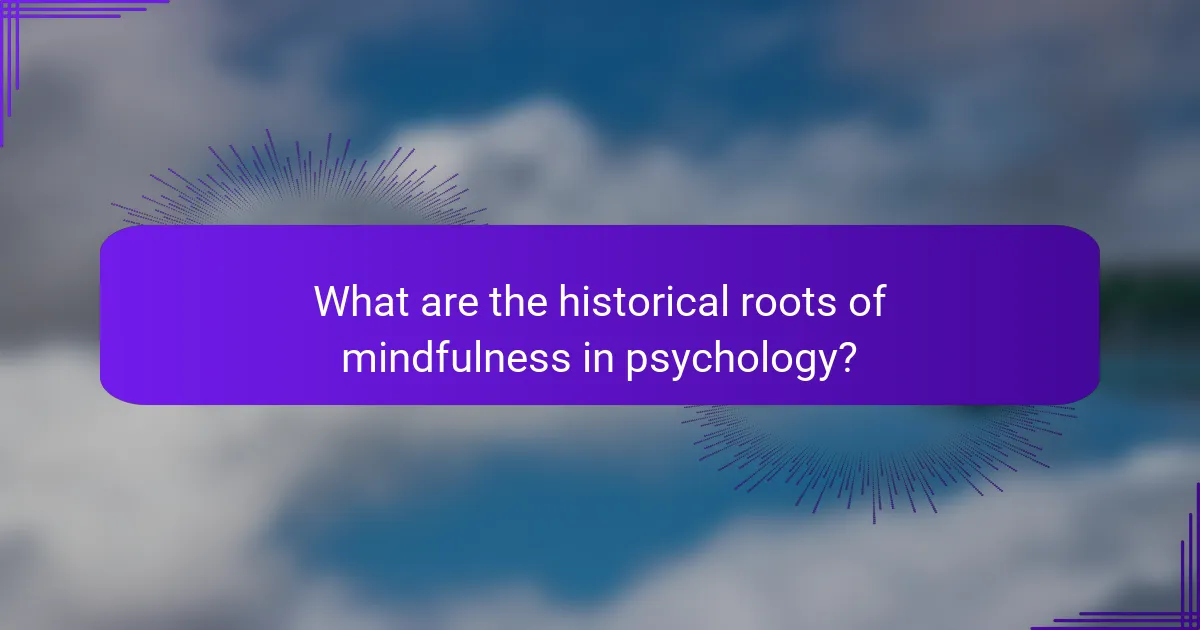
What are the historical roots of mindfulness in psychology?
The historical roots of mindfulness in psychology trace back to ancient Eastern philosophies, particularly Buddhism, where mindfulness was practiced as a means to achieve mental clarity and emotional balance. Over time, these concepts were integrated into Western psychological practices, leading to a broader understanding and application of mindfulness in therapeutic settings.
Origins in Eastern philosophy
Mindfulness originated in Eastern philosophies, especially within Buddhist teachings, where it is known as “sati.” This practice emphasizes awareness of the present moment and encourages individuals to observe their thoughts and feelings without judgment. Techniques such as meditation and mindful breathing were developed to cultivate this awareness, aiming for spiritual growth and mental well-being.
In addition to Buddhism, other Eastern traditions, such as Taoism and Hinduism, also incorporate mindfulness-like practices. These philosophies stress the importance of being present and the interconnectedness of all things, which further enriches the understanding of mindfulness as a holistic approach to mental health.
Integration into Western psychology
The integration of mindfulness into Western psychology began in the late 20th century, significantly influenced by figures like Jon Kabat-Zinn, who developed Mindfulness-Based Stress Reduction (MBSR). This program adapted traditional mindfulness practices for a clinical setting, demonstrating effectiveness in reducing stress, anxiety, and chronic pain.
Today, mindfulness is widely recognized in therapeutic practices, including Cognitive Behavioral Therapy (CBT) and Dialectical Behavior Therapy (DBT). These approaches utilize mindfulness techniques to help individuals manage their emotions and improve their mental health outcomes. As a result, mindfulness has become a valuable tool in various psychological treatments across diverse populations.

How can mindfulness be practiced daily?
Mindfulness can be practiced daily through simple techniques that enhance awareness and presence in the moment. Incorporating mindfulness into your routine can improve focus, reduce stress, and promote overall well-being.
Mindful meditation techniques
Mindful meditation involves focusing attention on the present moment, often through breath awareness or body scanning. Start with short sessions of 5-10 minutes, gradually increasing the duration as you become more comfortable. Techniques like guided meditations or using mindfulness apps can help structure your practice.
Consider trying different styles, such as loving-kindness meditation, which fosters compassion, or mindfulness of thoughts, where you observe your thoughts without judgment. Experimenting with these techniques can help you find what resonates best with you.
Incorporating mindfulness into routines
Integrating mindfulness into daily routines can be achieved through simple practices. For instance, practice mindful eating by savoring each bite and paying attention to flavors and textures. This not only enhances your meal experience but also promotes healthier eating habits.
You can also incorporate mindfulness during daily activities like walking or showering. Focus on the sensations of your feet on the ground or the feel of water on your skin. Setting reminders throughout the day to pause and take a few deep breaths can reinforce this practice.
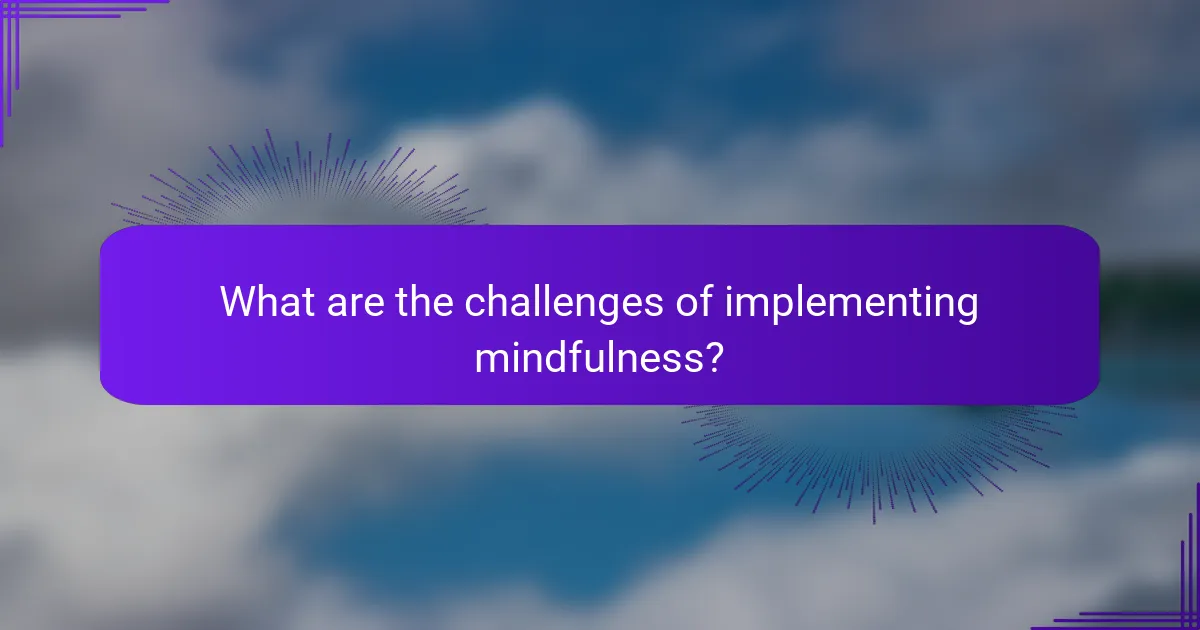
What are the challenges of implementing mindfulness?
Implementing mindfulness can be challenging due to various factors, including resistance from practitioners and misunderstandings about the practices themselves. These obstacles can hinder the effective integration of mindfulness into therapeutic settings.
Resistance in traditional therapy settings
Many therapists may resist incorporating mindfulness into their practice due to a lack of training or familiarity with the techniques. This resistance can stem from concerns about deviating from established therapeutic methods or skepticism regarding mindfulness’s efficacy.
To address this, therapists can benefit from professional development opportunities focused on mindfulness. Engaging in workshops or training programs can enhance their understanding and comfort level, making them more open to integrating mindfulness into their sessions.
Misunderstandings of mindfulness practices
Misunderstandings about what mindfulness entails can lead to ineffective application. Some individuals may perceive mindfulness as merely relaxation or stress relief rather than a comprehensive approach to awareness and presence.
Clarifying the core principles of mindfulness—such as non-judgmental awareness and acceptance—can help dispel these misconceptions. Practitioners should emphasize that mindfulness involves active engagement with thoughts and feelings, rather than simply trying to clear the mind.
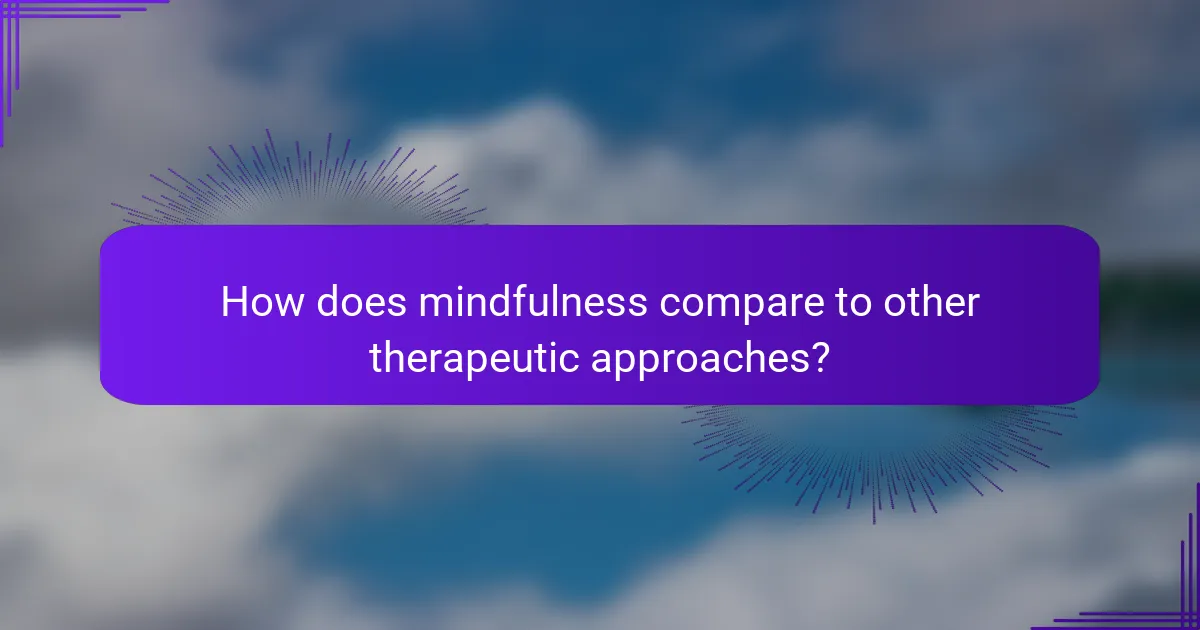
How does mindfulness compare to other therapeutic approaches?
Mindfulness differs from other therapeutic approaches by emphasizing present-moment awareness and acceptance rather than focusing on past experiences or future anxieties. This practice can enhance emotional regulation and reduce stress, making it a valuable complement to traditional therapies.
Cognitive Behavioral Therapy (CBT)
Cognitive Behavioral Therapy (CBT) focuses on identifying and changing negative thought patterns. In contrast, mindfulness encourages individuals to observe their thoughts without judgment. While CBT aims to alter cognitive distortions, mindfulness fosters acceptance of thoughts and feelings, which can enhance the effectiveness of CBT when combined.
Dialectical Behavior Therapy (DBT)
Dialectical Behavior Therapy (DBT) incorporates mindfulness as a core component, aiming to help individuals manage intense emotions. DBT teaches skills for emotional regulation and interpersonal effectiveness, while mindfulness practices within DBT enhance self-awareness and acceptance. This synergy can lead to improved outcomes for individuals with borderline personality disorder and other emotional challenges.
Acceptance and Commitment Therapy (ACT)
Acceptance and Commitment Therapy (ACT) shares similarities with mindfulness, as both emphasize acceptance of thoughts and feelings. ACT encourages individuals to commit to actions aligned with their values while accepting discomfort. Mindfulness serves as a foundational skill in ACT, promoting psychological flexibility and resilience.
Humanistic Approaches
Humanistic approaches, such as person-centered therapy, focus on self-actualization and personal growth. Mindfulness complements these approaches by fostering self-awareness and present-moment engagement. Practicing mindfulness can enhance the therapeutic relationship by promoting empathy and understanding between the therapist and client.
